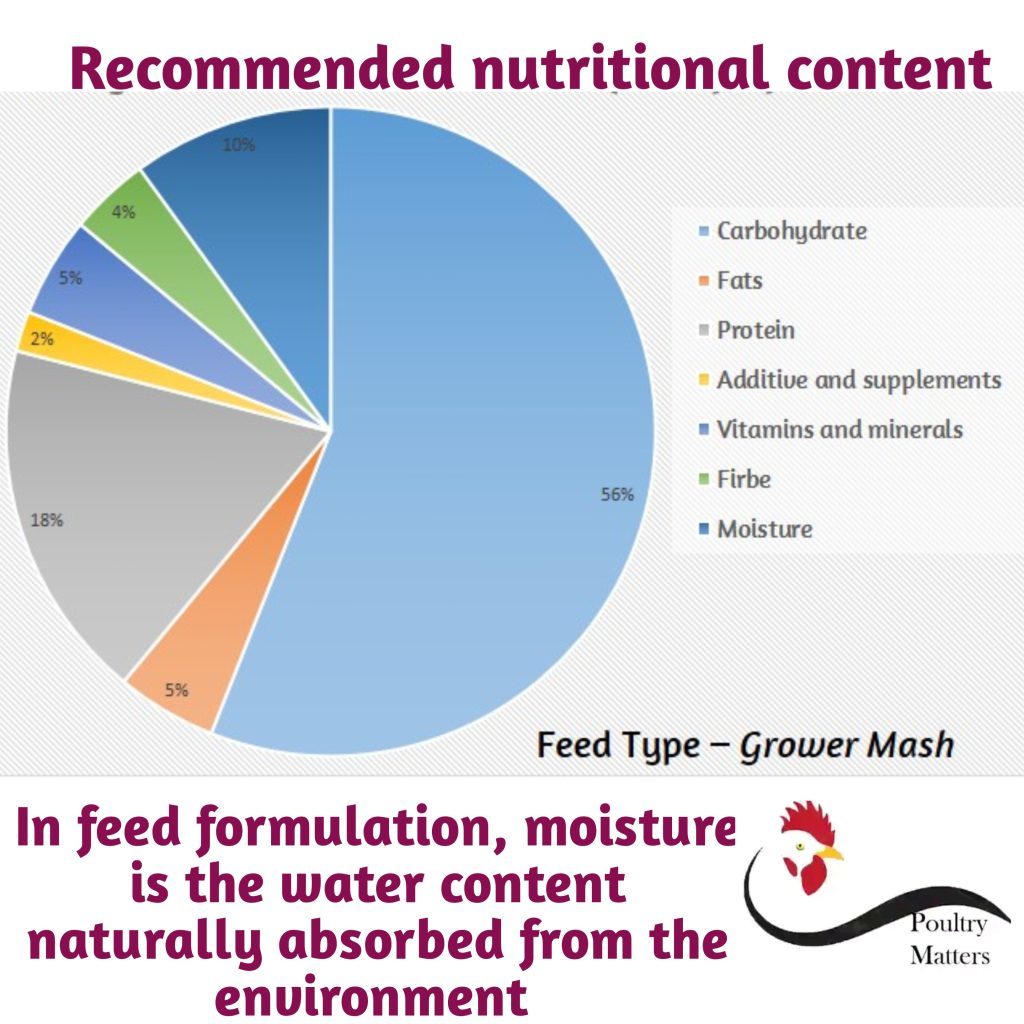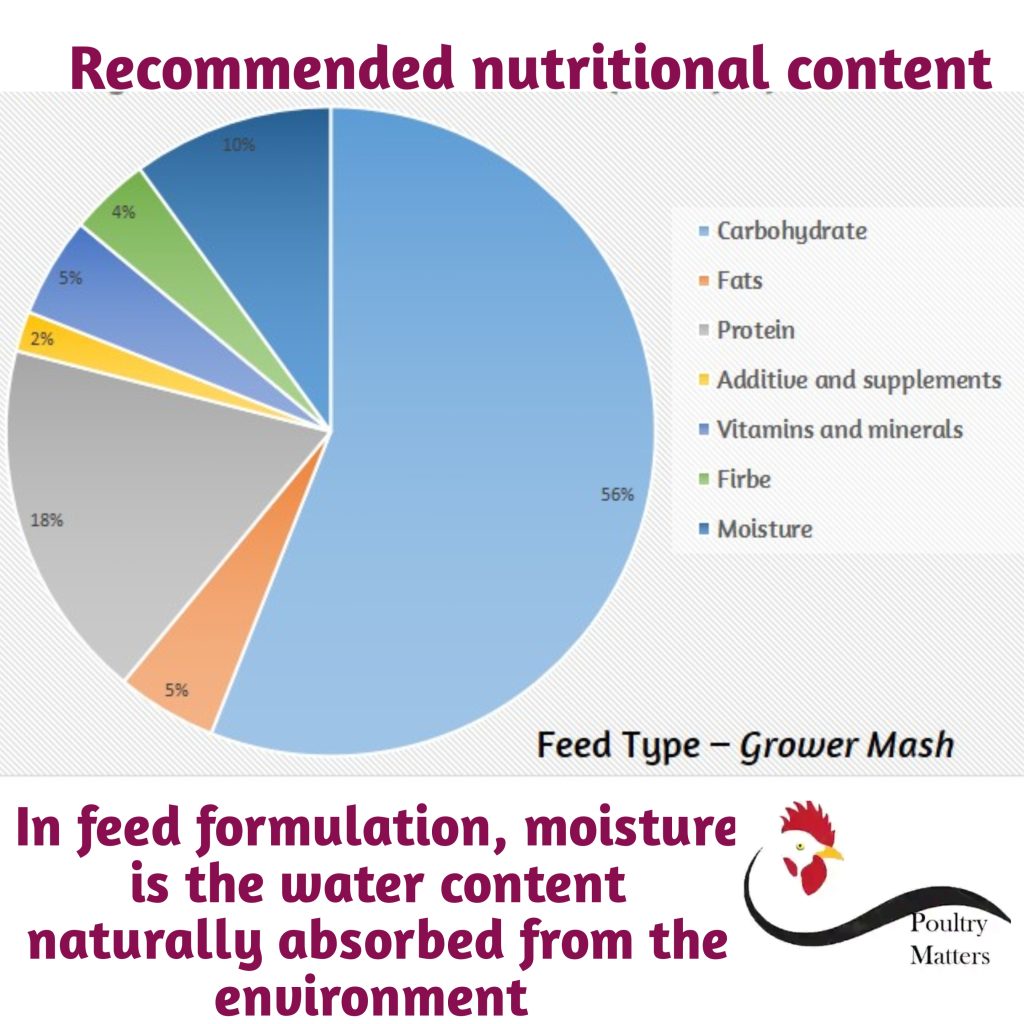Understanding Poultry Feed Content In The Right Proportion
A balanced poultry diet is one of the most critical factors that influence the health, productivity, and profitability of any poultry farming venture. Whether you’re raising broilers, layers, or breeders, the nutritional composition of the feed you provide directly impacts on growth rates, egg production, immunity, and overall flock performance.
What is a balanced poultry diet?
A balanced poultry diet refers to feed that contains all essential nutrients in the correct proportion needed to support optimal growth, development, and productivity in the bird(s). These nutrients include:
- Carbohydrate which provides energy
- Protein which support growth and tissue repair
- Fats which provides energy and supports absorption of fat-soluble vitamins
- Vitamins and minerals which enhance immunity in the birds, support bone health and metabolic activities
- Water, this is often overlooked but it is an essential part of the poultry diet supporting digestion process, temperature regulation and nutrient transport round the body
Each of these components plays a unique role and must be provided in appropriate quantities based on the:
- Age (starter, grower or finisher mash)
- Type (Layer or broiler)
- Purpose of the birds (meat or egg production).
Key Nutrient Components of Poultry Feed
Carbohydrates & Fats:
These classes are essential energy sources in poultry nutrition. They provide the fuel needed for growth, egg production, body maintenance, and daily activity.
Fats though required in smaller amounts, are concentrated energy sources. They improve feed efficiency, enhance nutrient absorption (especially fat-soluble vitamins), and contribute to better egg size and quality.
- Source of carbohydrate – Maize, sorghum, millet or cassava
- Source of Fats – Vegetable oil, fish oil, animal fat
- Required percentage in feed – Carbohydrate is major part of the feed, usually about 55% – 60% of the total diet content while the fats should not be more than 5%
Protein:
This is a vital nutrient in poultry diets, essential for growth, tissue development, egg production, and overall bird health. It provides the amino acids needed to build muscles, feathers, enzymes, and hormones.
Young chicks specially need high-quality protein for rapid growth and development, while layers require it to maintain good egg production and shell quality.
- Source – Groundnut cake, fish meal, blood meal, soya bean meal
- Required percentage in feed – Content requirement ranges from about 16% to 24% depending on the age of the bird (starter, grower or finisher)
Vitamins and Minerals:
These nutrients play vital roles in supporting the overall health, productivity, and efficiency of poultry birds. They help regulate body processes, strengthen immunity, and promote proper growth, reproduction, and bone development.
- Vitamins (like A, D, E, and B-complex) are essential for good vision, bone strength, energy metabolism, and reproductive health.
Minerals (such as calcium, phosphorus, and sodium) are vital for eggshell formation, skeletal development, nerve function, and fluid balance.
- Source – bone meal, lime stone, premixes, oyster shell
- Required percentage in feed –
NB – A deficiency in these nutrients can lead to poor growth, weak bones, reduced egg production, and increased vulnerability to diseases.
Required vitamins and minerals are not limited to what have been mentioned here now, there are more.
Fiber:
Fiber plays an important role, though, often overlooked in poultry nutrition. Poultry birds have a limited ability to digest fibre compared to ruminants, however, a small amount of fibre in the poultry diet is necessary, for proper gut function, nutrient absorption and overall health.
- Source – Wheat bran, rice bran, sunflower seed cake, groundnut husks
- Requirement percentage in feed – Needed in very small quantity that must not exceed 5% – 7% of total feed content.
Additives and Supplements:
These are essential components in poultry feed used to enhance the nutritional value, improve bird health, boost overall performance and productivity of the flock.
Basically, additives and supplements are necessary for the following reasons in the poultry diet –
- Promote Growth: Additives such as amino acids and enzymes help improve feed conversion efficiency and support faster, healthier growth in broilers and layers.
- Enhance Immunity: Supplements like vitamins (A, D, E) and minerals (zinc, selenium) strengthen the immune system, helping birds resist diseases.
- Improve Digestion: Enzymes and probiotics aid in breaking down complex feed components, improving nutrient absorption and gut health.
- Prevent Diseases: Certain additives (e.g., coccidiostats, mycotoxin binders) are included to prevent specific health issues, reducing mortality and maintaining flock health.
- Boost Egg Production and Quality: Calcium, phosphorus, and vitamin D supplements are critical for strong eggshell formation and consistent laying performance in layers.
- Enhance Feed Palatability and Shelf-life: Additives like flavors and antioxidants improve taste and preserve feed freshness.
Required percentage in feed – Additives and supplements are complementary items in the poultry diet, therefore it is recommended that inclusion rate for any supplement or additive must be made based on the advice of manufacturer or a poultry nutritionist to avoid overdosing or underfeeding.
Clean Water:
This is an essential component of poultry nutrition. Birds require water not just for hydration but also to support vital body functions such as digestion, nutrient absorption, temperature regulation, and waste removal. Water helps soften feed in the crop, assists in the breakdown of nutrients, and transports them throughout the body.
A constant supply of fresh, clean water improves feed intake, boosts growth performance, supports egg production, and enhances the overall health and immunity of the flock. Contaminated or insufficient water can lead to reduced feed consumption, dehydration, disease outbreaks, and economic losses.
NB – In poultry farming, fresh clean water is not just as important as feed – without it, the birds cannot thrive
Formulating Feed Based on Bird Age
This is essential for ensuring optimal growth, health, and productivity of the flock. At different stages of a bird’s life — starter, grower, and layer or finisher, the bird requires specific nutritional compositions to meet changing physiological needs. Young chicks need high protein for rapid growth, while mature birds require balanced nutrients to maintain egg production or body weight. Providing age-appropriate feed ensures efficient nutrient utilization, reduces waste, and supports the overall performance of the flock Based on the age of the bird, there are three (3) categories of the poultry feed, detailed as below –
Starter feed:
This is for birds within 0 – 4 weeks old. At this stage, it does not matter if the chicken is a layer bird or broiler bird. The starter feed is high in protein (usually between 20% – 24%). The following are the purpose of the starter feed –
Grower feed:
This is essential for birds within the age of 5 – 14weeks. The protein content in grower feed is moderate protein (usually between 16% – 18%) as the birds during this time need more energy giving feed to support daily activities.
NB – Usually broiler birds are harvested within 9week and week 12, therefore to prepare the birds for the market, the broiler feed is changed to finisher from about the age week 7.
For the layer birds that stays longer before they are harvested, the feed is usually changed to the layer mash within week 14 and week 15. The layer mash supports the reproductive ability of the birds by optimizing the laying of eggs.
Benefits of a well-balanced poultry diet on the flock
- Promote growth rate and market weight
- Enhances optimal health and productivity of the flock
- Improves bird resistance to disease
- Significantly reduces the risk of mortality among the flock
- Ensures feed efficiency and better conversion rate
- Contributes to improved farm profitability
Conclusion
Understanding poultry feed content and ensuring the right proportions of each nutrient is non-negotiable for every serious poultry farmer. A well balanced poultry diet is the foundation of a productive, profitable and sustainable poultry farm operation.
Whether you’re mixing your feed or buying commercial rations, always ensure it meets the nutritional needs of your birds at each stage of their lifecycle.
We would love to hear from you – share your experience with us in the comment.
We are your colleague, partner and friend in all poultry matters.

Read more on maize alternatives
Cheers.

